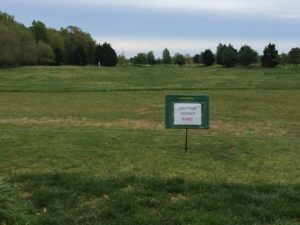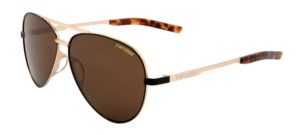A glimmer of hope
May 8, 2020
Two bits of good news announced this week should brighten the mood of Cape Region golfers and their friends in Maryland.

The practice range at Rookery South uses these small signs to remind golfers to keep their 6-foot distance.
Delaware’s Governor John Carney announced May 5 that golf courses may resume renting motorized golf carts and push carts, with appropriate cleaning protocols in place, effective 8 a.m. May 8. Cart use is limited to one rider at a time, however.
Maryland’s Governor Larry Hogan announced May 6 that golf courses in his state may also re-open. Unlike Delaware and Virginia, Maryland had closed all courses as part of the state’s coronavirus response.
In the announcement about loosening the cart limit as well as other restrictions, Carney said, “I understand how hard this has been for Delawareans across our state. We’ve tried to find ways to ease the pain without compromising public health. But even these limited steps allowing businesses to offer additional services will require strict compliance with safety standards, especially social distancing. We cannot afford to go backwards and see new cases and hospitalizations spike. Getting used to a new normal won’t be easy, but this is the first step to being able to reopen our economy.”
Butch Holtzclaw, the head golf professional for The Rookery, said, “It’s nice to see this first move toward getting back to normal. All of our local businesses need to see more of this and get back to normal operations as soon as we can.”
Restoring cart rentals is a good thing, but the single-rider restriction presents major challenges to golf course operators. Most clubs do not have enough motorized carts to handle the normal demand if there is only one player per cart. The one-rider limit also acts as a 50% cut in likely cart revenue even at full use.
Austin Ebersole is the golf teaching professional at American Classic Golf Club. He said they would “let people know that the course will probably have some shortage of carts and suggest players should inquire about a riding cart before booking a tee time.” Given the circumstances, he asked golfers “to be understanding and to still walk if you can.”
In the meantime, motorized cart restrictions helped create a bump in walking cart sales nationwide as well as locally. Ebersole said, “We have had a few of our golfers say they can’t find any walking carts online.”
Much more has to happen before golf courses can operate in anything like their prior routines, and the ongoing and downstream revenue effects will be felt for months if not more.
Clubhouses remain shuttered, with food and beverage operations limited to carryout service. This eliminates regular outings as well as charity fundraiser tournaments, for whom meals and a gathering for auctions and the like are critical to successfully helping local charities.
Cape Region courses usually benefit from out-of-state tourism each spring and fall, with golf-hungry visitors from points north traveling here and further south to the courses near Ocean City, MD. That revenue base disappeared for now. It is still an open question whether that tourist trade can resume this fall.
Cape Region golf league play and other regular weekly club events are normally well underway by now. They are not happening because they depend on shotgun starts (crowding), full cart availability, and regular access to food and beverages. Either a second or third phase of the re-opening is likely required before those events can return to action.
Charity fundraiser tournament organizers also face the daunting prospect of seeking sponsor support from local businesses, where the real money is raised over and above the entry fees. As one golf pro said, “Not that people won’t sponsor but more that people do not want to ask [for sponsorships] with all these businesses are going through.”
Some courses are trying to reschedule their normal spring events into the fall season. However, even the fall fundraisers are affected by the pandemic. Most require a long lead time, from publicity to seeking donations for the usual live auctions. It’s entirely possible that new forms of fundraising will be needed, for example the online auctions used by organizations such as the Leukemia & Lymphoma Society.
Cape Region golf courses are a significant economic and social resource for the community. Let’s hope they can recover fully once this particular storm blows over.

Tifosi’s Shwae aviators
Tifosi contributes to mask needs with May offer
Tifosi Optics makes and sells a wide variety of reasonably-priced sunglasses. I tested one of its golf-specific models a while ago and it is a regular part of my current rounds. More recently the company sent me a pair of Shwae Aviators, part of its Lifestyle group ($35 SRP). They worked well during a sunny boat ride.
This week Tifosi announced a new initiative aimed at helping healthcare workers during the pandemic. It commissioned professional grade face shields, featuring anti-fog plastic covering the entire face with forehead foam for protection and comfort. For the month of May the company will donate a face shield to healthcare facilities for each pair of sunglasses it sells through its website, tifosioptics.com.
That is a nice gesture.

